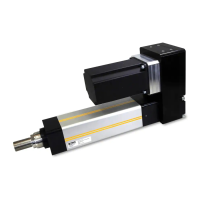Operating / Mounting instruction
16 192-550003N10 ETH ATEX December 2019
1.9.6. ATEX specific safety instructions
1.9.6.1 ATEX specific safety instructions
If the operating instructions and the technical specifications are not respected, the
declaration of conformity expires in accordance to the ATEX directive
1.9.6.2 General safety instructions - ATEX
The operator of the entire system must ensure that the ETH is mounted by
authorized and qualified personnel only. Authorized personnel means trained
specialized employees of the customer, the manufacturer or of a service partner,
who work in accordance with the specifications for explosion protection.
The linear actuators may not be modified with respect to the design or
safety-related features without the written approval of Parker Hannifin
Manufacturing Germany GmbH & Co. KG. Any unauthorized modification in this
respect will exclude any liability on the part of Parker Hannifin Manufacturing
Germany GmbH & Co. KG.
It is strictly forbidden to dismount or disable safety and protection devices.
In addition, the following rules and regulations apply as a matter of course:
the applicable regulations for health and safety at work,
generally accepted rules for the safe operation of machinery,
the EC Directives and
any special regulations of the respective country/state.
1.9.6.3 Product specific safety instructions
Danger of explosion when working in explosive atmospheres!
If the system where the cylinder is to be mounted is surrounded by an explosive
atmosphere, it may ignite during work.
Do always respect the local installation regulations.
Danger of explosion due to spark formation!
Electrostatic charge of the cylinder may lead to sparks and cause danger of
explosion in explosion protection zones.
Avoid electrostatic charge.
The cylinder must be grounded and be a part of the grounding concept. Ground
cylinder via the motor and the cylinder mounting (machine frame).
Mechanical charges cause sparks and danger of explosion.
Never expose the cylinder to powers of impact during transport, mounting and
operation.
Some thrust rod ends and mounting methods permit oscillating rotational and
pivoting movements of the cylinder. If these elements are used:
Make sure, that circumferential speeds at the friction surfaces do not exceed
1 m/s.
Never twist or bend the cylinder or fix it under stress.
Avoid incorrect load mounting at the thrust rod end, see chapter 4:
Commissioning.

